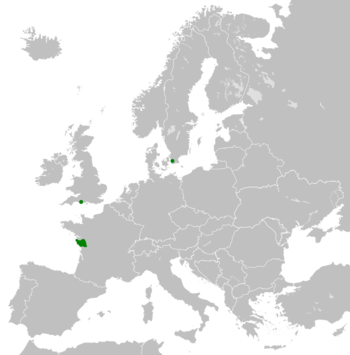Kingdom of the Vendée
Kingdom of the Vendée Royaume de Vendée | |
|---|---|
|
Flag | |
| Motto: Pour Dieu et le Roi! | |
 The Kingdom of the Vendée in 2021 | |
| Capital | Bourbon-Vendée |
| Official languages | French, Latin, Poitevin |
| Religion | Roman Catholicism |
| Demonym(s) | Vendean |
| Government | Unitary absolute monarchy |
• Monarch | Henri I |
| Wheelchair Historian | |
| Legislature | Estates General |
| Historical events | |
• Independence | 22 September 2021 |
| Area | |
• Total | 6,720 km2 (2,590 sq mi) |
| Currency | Vendean Franc (VDF) |
| Time zone | UTC+1 (CET (capital)) |
• Summer (DST) | UTC+2 (CEST (capital)) |
The Kingdom of the Vendée (French: Royaume de Vendée), is an absolute monarchy that lays claim to the Vendée region of France. It was founded in 2021 by Henri le Grand. The Kingdom of the Vendée has declared itself sovereign but it is not recognized as a country by the United Nations or any world government. It operates under the unitary absolute monarchy of its monarch, Henri I, who rules in exile from southern England.
The Kingdom is a thematic micronation, drawing its ideals from the Ancien Régime of France and other similar Bourbonesque styles. It maintains global colonial possessions, ranging from territories in the Americas to other locations in continental Europe and beyond. These possessions are maintained by regional governors, who respond directly to the reigning monarch and his demands, and are also responsible for the financial and infrastructural governance of their respective governates. The king rarely visits these territories and they act independently on most matters, though are frequently required to attend ceremonies of court and are compelled to contribute reports to the crown on their state of affairs.
The Vendée has a small economy and the government's main source of income is a grant provided by the monarch from his own private wealth, alongside taxes collected from a small number of private individuals. Much of this funding is put towards royal expenses and basic infrastructure, and additionally towards military spending, which is directed by the king himself. The military is a sizeable force and consists primarily of an armed and maritime force, though much of the state's defences are managed by local militias centred in various territories, administrated by governors and local citizens of the kingdom. Despite these precautions and preparations, the Vendée has never been involved in any major conflicts and maintains a mostly internationally peaceful foreign policy, opening alliances with various other states. This path of peace also manifests in the nation's primarily moderate colonial policies.
Etymology
The name of the Vendée refers to the French region of the same name, where a royalist counter-revolution took place against the First French Republic. The name Vendée itself is derived from the Vendée River which runs through the southeastern part of the country. The river was attested as Fluvium Vendre in the 10th century, and as Flumen Vendee and Vendeia by the 11th century. According to popular etymology, the name ultimately derives from the Celtic toponym vindo- meaning white or brilliant in a sacred context (as in the Modern Welsh gwyn/wyn). The name likely originates in Proto-Celtic or Gaulish, but may also have originated in the Gallo or Old Breton languages.
History
Independence and Expansion
The independence of the Vendée was established upon the day of the nation's foundation on the 22nd of September, the same day on which Henri I decreed himself to be King of the Vendée and established a government consisting of close fellow royalists and colonial administrators. The young state began to immediately attempt to establish diplomatic relations with nations such as the Republic of Molossia and the Kingdom of Roydenia, and also contacted the United Nations in a recognition attempt, stating that a lack of response would imply a lack of objection; the United Nations never responded. The nation also began to build its colonial empire, obtaining territories in North America and embassies in both Sweden and the United States. All of these lands are governed directly by the crown legally, although in reality, colonial governors execute nearly absolute power over their respective realms. The current seat of the monarch, located in the English county of Dorset, is also formally a colony, though serves as the residence of the crown and the office of most national governance.
Government
Monarch
The Vendée is an unitary absolute monarchy, under the rule of the self-styled king, Henri I.
Chief Minister
The Chief Minister is the head of the Council of Ministers and is also usually member of the King's Council. They are responsible for the government of the kingdom and respond directly to the monarch.
Estates General
The Estates General, a legislative and consulative assembly, serves to represent the subjects of the kingdom, and is assorted into three estates. The Estates General holds no power in its own right, and serves entirely as a formally and functionally advisory institution.
Foreign Relations
Vendée maintains an open foreign policy. The Ministry of Foreign Affairs is responsible for making decisions on foreign policy and forging relations with other nations, though the monarch often personally forms alliances. The ministry is also responsible for permitting and denying citizenship applications and residency applications.
| Flag | Name | Treaty Ratified | ||||||||||
|---|---|---|---|---|---|---|---|---|---|---|---|---|
| Bilateral Recognition | ||||||||||||

|
Kingdom of Roydenia | 23 September 2021 | ||||||||||
